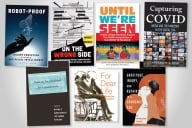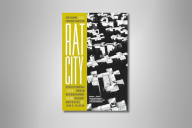You have /5 articles left.
Sign up for a free account or log in.
For this week’s column (the last one until the new year) I asked a number of interesting people what book they’d read in 2010 that left a big impression on them, or filled them with intellectual energy, or made them wish it were better known. If all three, then so much the better. I didn’t specify that it had to be a new book, nor was availability in English a requirement.
My correspondents were enthusiastic about expressing their enthusiasm. One of them was prepared to name 10 books – but that’s making a list, rather than a selection. I drew the line at two titles per person. Here are the results.
Lila Guterman is a senior editor at Chemical and Engineering News, the weekly magazine published by the American Chemical Society. She said it was easier to pick an outstanding title from 2010 than it might have been in previous years: “Not sleeping, thanks to a difficult pregnancy followed by a crazy newborn, makes it almost impossible for me to read!”
She named Rebecca Skloot’s The Immortal Life of Henrietta Lacks, published by Crown in February. She called it an “elegantly balanced account of a heartbreaking situation for one family that simultaneously became one of the most important tools of biology and medicine. It was a fast-paced read driven by an incredible amount of reporting: A really exemplary book about bioethics.”
Neil Jumonville, a professor of history at Florida State University, is editor of The New York Intellectual Reader (Routledge, 2007). A couple of collections of essays he recently read while conducting a graduate seminar on the history of liberal and conservative thought in the United States struck him as timely.
“The first is Gregory Schneider, ed., Conservatives in America Since 1930 (NYU Press, 2003). Here we find a very useful progression of essays from the Old Right, Classical Liberals, Traditional Conservatives, anticommunists, and the various guises of the New Right. The second book is Michael Sandel, Liberalism and Its Critics (NYU Press, 1984). Here, among others, are essays from Isaiah Berlin, John Rawls, Robert Nozick, Alisdair MacIntyre, Michael Walzer, a few communitarians represented by Sandel and others, and important pieces by Peter Berger and Hannah Arendt.”
Reading the books alongside one another, he said, tends to sharpen up one's sense of both the variety of political positions covered by broad labels like “liberal” and “conservative” and to point out how the traditions may converge or blend. “Some people understand this beneficial complexity of political positions,” he told me, “but many do not.”
Michael Yates retired as a professor of economics and labor relations at the University of Pittsburgh at Johnstown in 2001. His most recent book is In and Out of the Working Class, published by Arbeiter Ring in 2009.
He named Wallace Stegner’s The Gathering of Zion: The Story of the Mormon Trail, originally published in 1964. “I am not a Mormon or religious in the slightest degree,” he said, “and I am well aware of the many dastardly deeds done in the name of the angel Moroni, but I cannot read the history of the Mormons without a feeling of wonder, and I cannot look at the sculpture of the hand cart pioneers in Temple Square [in Salt Lake City] without crying. If only I could live my life with the same sense of purpose and devotion…. It is not possible to understand the West without a thorough knowledge of the Mormons. Their footprints are everywhere."
Adam Kotsko is a visiting assistant professor of religion at Kalamazoo College. This year he published Politics of Redemption: The Social Logic of Salvation (Continuum) and Awkwardness (Zero Books).
“My vote," he said, "would be for Sergey Dogopolski's What is Talmud? The Art of Disagreement, on all three counts. It puts forth the practices of Talmudic debate as a fundamental challenge to one of the deepest preconceptions of Western thought: that agreement is fundamental and disagreement is only the result of a mistake or other contingent obstacle. The notion that disagreements are to be maintained and sharpened rather than dissolved is a major reversal that I'll be processing for a long time to come. Unfortunately, the book is currently only available as an expensive hardcover.”
Helena Fitzgerald is a contributing editor for The New Inquiry, a website occupying some ambiguous position between a New York salon and an online magazine.
She named Patti Smith’s memoir of her relationship with Robert Mapplethorpe, Just Kids, published by Ecco earlier this year and recently issued in paperback. “I've found Smith to be one of the most invigorating artists in existence ever since I heard ‘Land’ for the first time and subsequently spent about 24 straight with it on repeat. She's one of those artists who I've long suspected has all big secrets hoarded somewhere in her private New York City. This book shares a satisfying number of those secrets and that privately legendary city. Just Kids is like the conversation that Patti Smith albums always made you want to have with Patti Smith.”
Cathy Davidson, a professor of English and interdisciplinary studies at Duke University, was recently nominated by President Obama to serve on the National Council on the Humanities. She, too, named Patti Smith’s memoir as one of the books “that rocked my world this year.” (And here the columnist will interrupt to give a third upturned thumb. Just Kids is a moving and very memorable book.)
Davidson also mentioned rereading Tim Berners-Lee's memoir Weaving the Web, first published by HarperSanFrancisco in 1999. She was “inspired by his honesty in letting us know how, at every turn, the World Wide Web's creation was a surprise, including the astonishing willingness of an international community of coders to contribute their unpaid labor for free in order to create the free and open World Wide Web. Many traditional, conventional scientists had no idea what Berners-Lee was up to or what it could possibly mean and, at times, neither did he. His genius is in admitting that he forged ahead, not fully knowing where he was going….”
Bill Fletcher Jr., a senior scholar at the Institute for Policy Studies, is co-author, with Fernando Gapasin, of Solidarity Divided, The Crisis in Organized Labor and A New Path Toward Social Justice, published by the University of California Press in 2009.
He named Marcus Rediker and Peter Linebaugh’s The Many-Headed Hydra: The Hidden History of the Revolutionary Atlantic (Beacon, 2001), calling it “a fascinating look at the development of capitalism in the North Atlantic. It is about class struggle, the anti-racist struggle, gender, forms of organization, and the methods used by the ruling elites to divide the oppressed. It was a GREAT book.”
Astra Taylor has directed two documentaries, Zizek! and Examined Life. She got hold of the bound galleys for James Miller’s Examined Lives: From Socrates to Nietzsche, out next month from Farrar Straus and Giroux. She called it “a book by the last guy I took a university course with and one I've been eagerly awaiting for years. Like a modern day Diogenes Laertius, Miller presents 12 biographical sketches of philosophers, an exploration of self-knowledge and its limits. As anyone who read his biography of Foucault knows, Miller's a master of this sort of thing. The profiles are full of insight and sometimes hilarious.”
Arthur Goldhammer is a senior affiliate of the Center for European Studies at Harvard University and a prolific translator, and he runs an engaging blog called French Politics.
“I would say that Florence Aubenas' Le Quai de Ouistreham (2010) deserves to be better known,” he told me. “Aubenas is a journalist who was held prisoner in Iraq for many months, but upon returning to France she did not choose to sit behind a desk. Rather, she elected to explore the plight of France's ‘precarious’ workers -- those who accept temporary work contracts to perform unskilled labor for low pay and no job security. The indignities she endures in her months of janitorial work make vivid the abstract concept of a ‘dual labor market.’ Astonishingly, despite her fame, only one person recognized her, in itself evidence of the invisibility of social misery in our ‘advanced’ societies.”
Anne Sarah Rubin is an associate professor of history at the University of Maryland, Baltimore County and project director for Sherman’s March and America: Mapping Memory, an interactive historical website.
The book that made the biggest impression on her this year was Judith Giesberg's Army at Home: Women and the Civil War on the Northern Home Front, published by the University of North Carolina Press in 2009. “Too often,” Rubin told me, “historians ignore the lives of working-class women, arguing that we don't have the sources to get inside their lives, but Giesberg proves us wrong. She tells us about women working in Union armories, about soldiers' wives forced to move into almshouses, and African Americans protesting segregated streetcars. This book expands our understanding of the Civil War North, and I am telling everyone about it.”
Siva Vaidhyanathan is a professor of media studies and law at the University of Virginia. His next book, The Googlization of Everything: (And Why We Should Worry), will be published by the University of California Press in March.
He thinks there should have been more attention for Carolyn de la Pena's Empty Pleasures: The Story of Artificial Sweeteners from Saccharin to Splenda, published this year by the University of North Carolina Press: “De la Pena (who is a friend and graduate-school colleague) shows artificial sweeteners have had a powerful cultural influence -- one that far exceeds their power to help people lose weight. In fact, as she demonstrates, there is no empirical reason to believe that using artificial sweeteners helps one lose weight. One clear effect, de la Pena shows, is that artificial sweeteners extend the pernicious notion that we Americans can have something for nothing. And we know how that turns out.”
Vaidhyanathan noted a parallel with his own recent research: “de la Pena's critique of our indulgent dependence on Splenda echoes the argument I make about how the speed and simplicity of Google degrades our own abilities to judge and deliberate about knowledge. Google does not help people lose weight either, it turns out.”
Michael Tomasky covers U.S. politics for The Guardian and is editor-in-chief of Democracy: A Journal of Ideas.
“On my beat,” he said, “the best book I read in 2010 was The Spirit Level (Bloomsbury, 2009), by the British social scientists Richard Wilkinson and Kate Pickett, whose message is summed up in the book's subtitle, which is far better than its execrable title: ‘Why Greater Equality Makes Societies Stronger.’ In non-work life, I'm working my way through Vasily Grossman's Life and Fate from 1959; it's centered around the battle of Stalingrad and is often called the War and Peace of the 20th century. I'm just realizing as I type this how sad it is that Stalingrad is my escape from American politics.”








